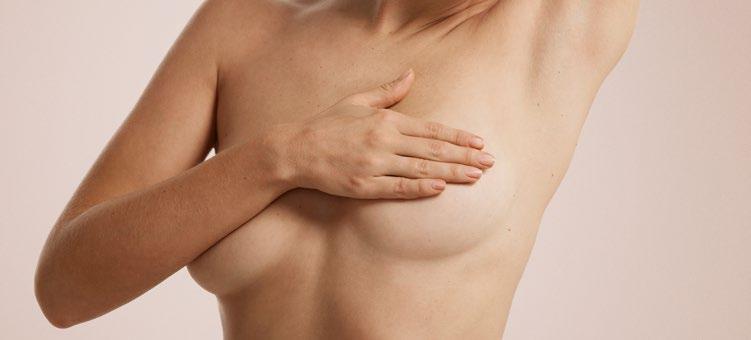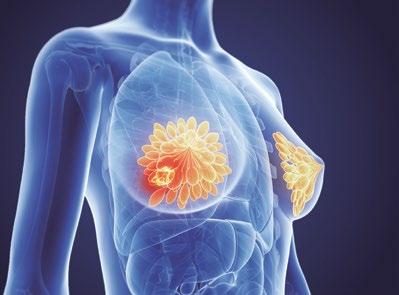
5 minute read
INTERVIEW - Myths and truths about breast cancer; the perpetual challenge of humanity - Dr. Emilio Murillo
Interview to Dr. Emilio Murillo Ramírez
According to UN data, breast cancer is currently the most common worldwide cancer, surpassing even lung cancer, which during more than two decades was the most frequent and deadly cancer1. Thanks to the proper implementation of disease detection programs by health authorities, as well as research protocols, many of the diseases that threaten the prevalence of future generations, such as different types of cancer, diabetes or various cardiovascular diseases, can be prevented or treated in time. Reducing mortality caused by breast cancer is one of the most important challenges in medical practice for the survival of the human species.
Advertisement
A large percentage of the mortality caused by this cancer lies in a poor culture of prevention. In addition, we currently see an information overload, especially in the digital media, where cancer and a myriad of relevant issues are addressed in a flashy and unscientific fashion. Thus, it is necessary to mention that not everything that is said about cancer is true, and that, on the contrary, several taboo subjects should be placed on the table by health experts in order to clarify the doubts that we often do not decide to express.
Here are some of the most common myths and truths about breast cancer, explained by Dr. Murillo:
IS BREAST CANCER PAINFUL BY ITSELF, OR IS IT PAINFUL BECAUSE OF THE TREATMENT?
This is complex to explain as it depends on several factors; it is uncomfortable and painful by itself and because of the oncological treatments.
In cases where cancer is located outside the organ where it arose (in this context, the breast itself), we call it metastatic breast cancer and the pain depends on the sites of the metastasis, as it can sometimes affect the brain, bones, lung and/or liver, causing symptoms due to direct lesion to that organ. Oncological treatments also produce discomfort and pain because our main ordnance for the treatment of breast cancer is the use of radiation (radiotherapy), surgery, and chemotherapy.
These treatments are applied even knowing that they may cause harm to patients because we seek a greater benefit vs. the harm they cause, this means, curing the disease. The main discomforts caused by cancer treatments are neuropathy (nerve damage), lymphedema (damage to circulation, especially in the arm) due to surgery and chemotherapy, nausea, vomiting, hair loss, decrease in blood and defenses, etc.
DO BREAST IMPLANTS INCREASE THE RISK OF CANCER?
Scientific studies have not demonstrated this risk association. They are considered safe, as long as they are implanted by a certified plastic surgeon.
(Reference: Cancer among Scandinavian women with cosmetic breast implants: a pooled long-term follow-up study. Lipworth L, Tarone RE, Friis S, Ye W, Olsen JH, Nyren O, McLaughlin JK. Int J Cancer. 2009;124(2):490.)

BREAST CANCER CANNOT BE DEVELOPED IN YOUNGER WOMEN?
False.
One of the main factors for the development of breast cancer is the hormonal effect, so it is rare to find breast cancer in girls and adolescents.
Indeed, we can find breast cancer in young women, especially an aggressive subtype called triple-negative (since it does not express sensitiveness to hormones and the Her2 neu protein/gene); this subtype of breast cancer is more common in our Hispanic population, compared with the Caucasian population.
Therefore, it is recommended to perform studies such as mammography, breast ultrasound, and magnetic resonance imaging if there is suspicion, even if the woman is young.
CAN OVERWEIGHT AND OBESITY CAUSE BREAST CANCER?
True, although its influence is low for the production of breast cancer.
Overweight and obesity have two relationships with breast cancer; the first is due to an increase in the production of female hormones in fat, which increases the risk of breast cancer; and the second is that it worsens the prognosis in patients with cancer because damage to other vital organs can occur due to the same obesity, similar to what has occurred with COVID-19 (increased morbidity).
CAN TIGHT-FITTING, STRAPPED, OR THE LACK OF UNDERWEAR BE A TRIGGER FOR BREAST CANCER?
No, they are not factors that increase the risk of breast cancer.
However, sometimes tight clothing can cause breast lesions to be noticed, due to the same discomfort caused by the presence of a mass within the breast, and this causes patients to look for medical attention, which is why people relate to it.
MEN CANNOT DEVELOP THIS TYPE OF CANCER?
False, men can develop breast cancer.
It is more common in men with other conditions that make their breast tissue (although scarce) be more sensitive to the hormonal effects of estrogens (female hormones); some of these diseases that increase the risk in men are Klinefelter syndrome, liver cirrhosis, BRCA 1 and 2 gene mutation, etc.
WHICH HAVE BEEN THE STRANGEST QUESTIONS YOU HAVE BEEN ASKED ABOUT BREAST CANCER?
I don’t think there are strange questions, it depends on personal nature.
Nevertheless, I have been asked if breast cancer is the result of witchcraft, punishment for misbehaving or unresolved feelings. But cancer is not caused by feelings, guilt, or wizardry. Carcinogenesis (cancer formation) develops due to a malfunction of cellular mechanisms of adaptation and evolution; in other words, genes and mechanisms that allow us to inherit our children (what we call evolution) our strengths, did not work properly or presented a failure (due to several factors such as smoking, hormones, genetic mutations, radiation, etc.), and a mutation occurred that caused a cell to grow independently and disorganized, acquiring the ability to harms us (in short, cancer).
DOES BREAST SIZE CORRELATE WITH THE LIKELIHOOD OF THE DISEASE?
False. What gives the size of the breast is the fat, not necessarily the size of the gland. There is no relationship between size and increased incidence of breast cancer.
DOES HAVING CHILDREN INFLUENCE THE ONSET OF CANCER?
True, because of breastfeeding. It has a beneficial influence, provided that breastfeeding lasts for more than 6 months.
Breastfeeding is a protective factor, as it benefits the maturation of breast tissue and the decrease in the effects of estrogens on the breast gland during lactation. And if we combine this with the fact that human milk is the best food for infants under 6 months of age, breastfeeding is highly recommended.
Dr. Emilio Murillo Ramírez

Surgeon and Midwife by the University of Guadalajara. Specialty in Internal Medicine at Centro Médico Nacional de Occidente, "Hospital de Especialidades Ignacio García Téllez", Instituto Mexicano del Seguro Social, Delegación Jalisco, Doctor assigned to the area of Oncology for the Instituto de Pensiones del Estado de Jalisco and for IMSS/HGR110 since 2010. Currently working at CidVID Investigación Biomédica.
The interview was generated by the publishing house of the Clinical Research Insider.










